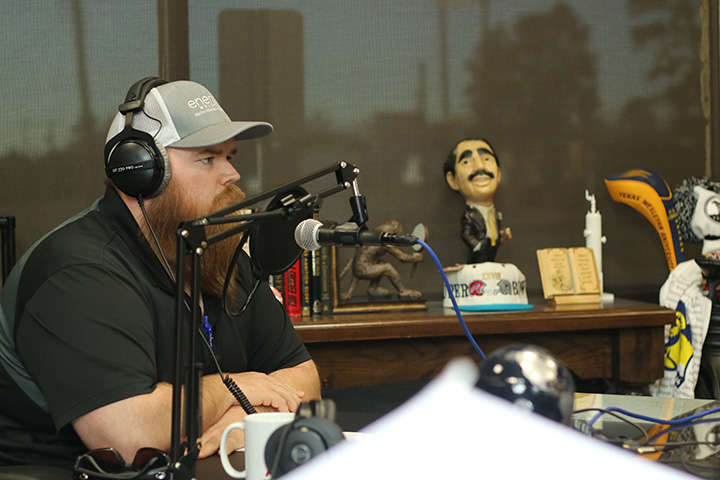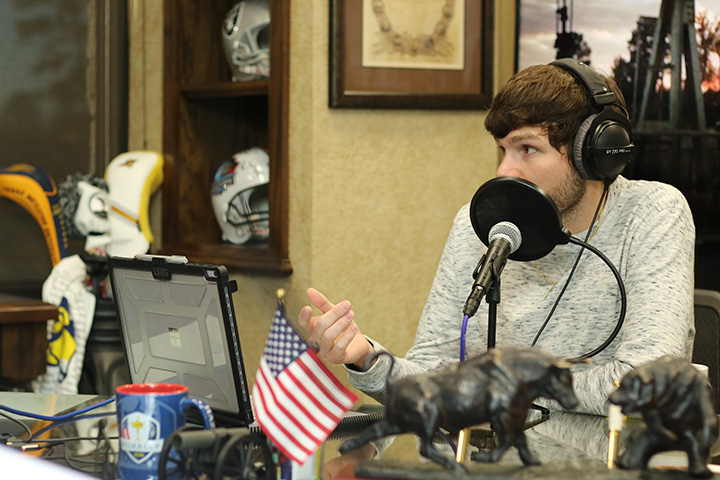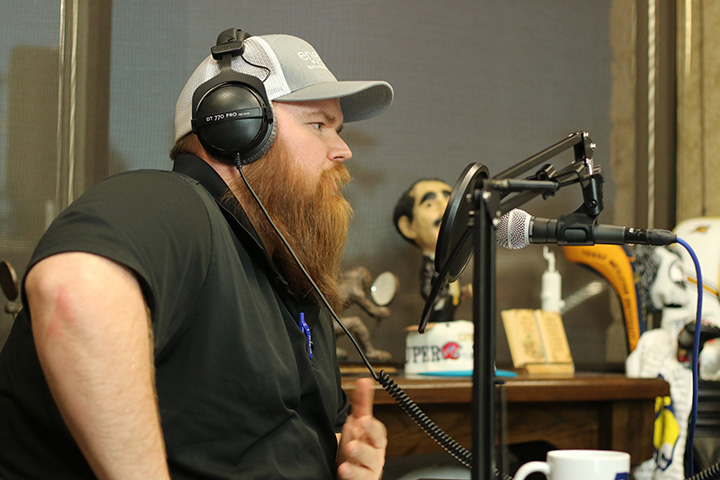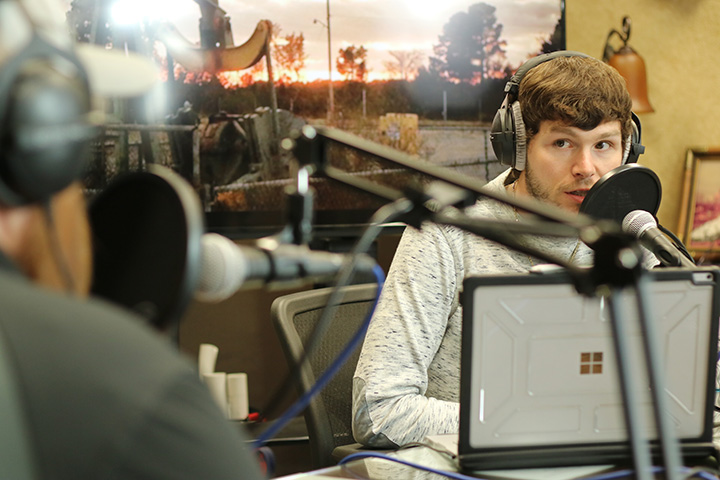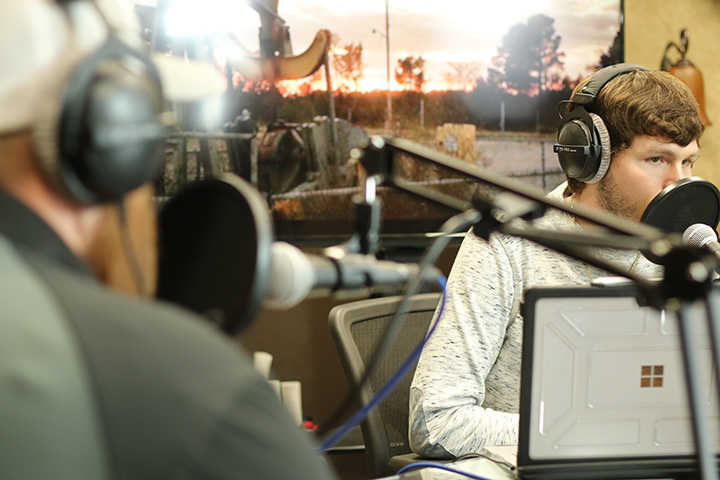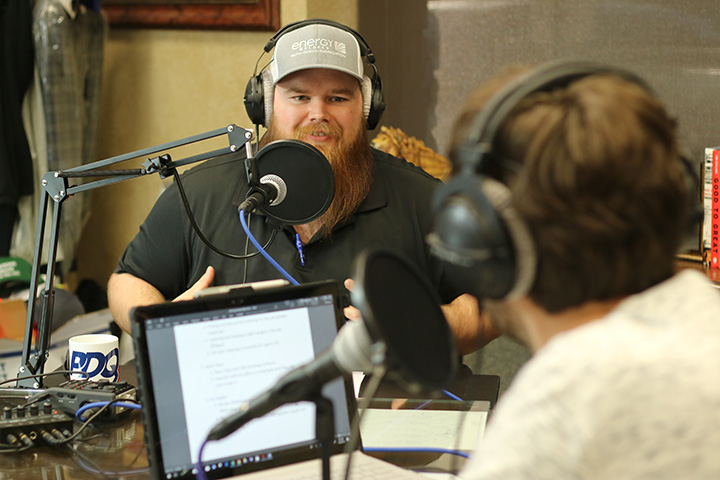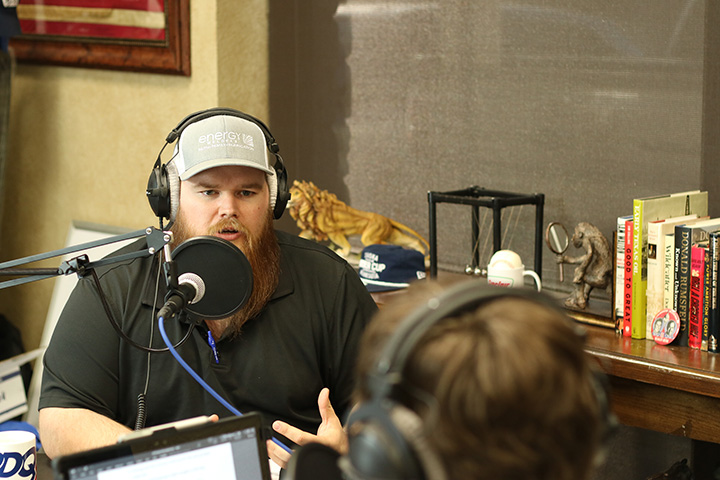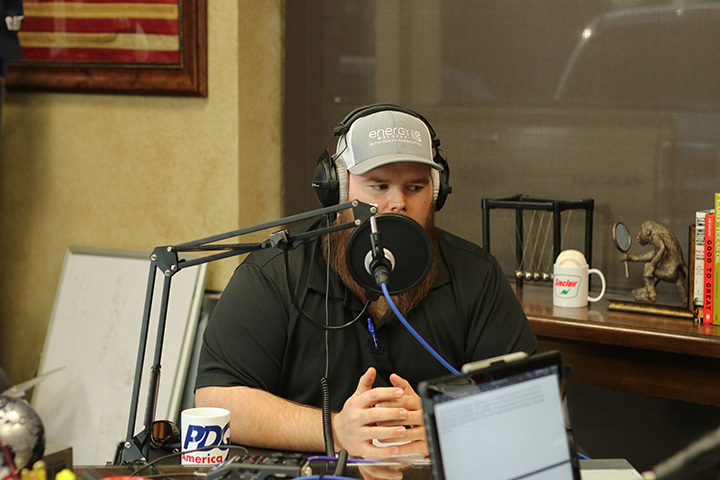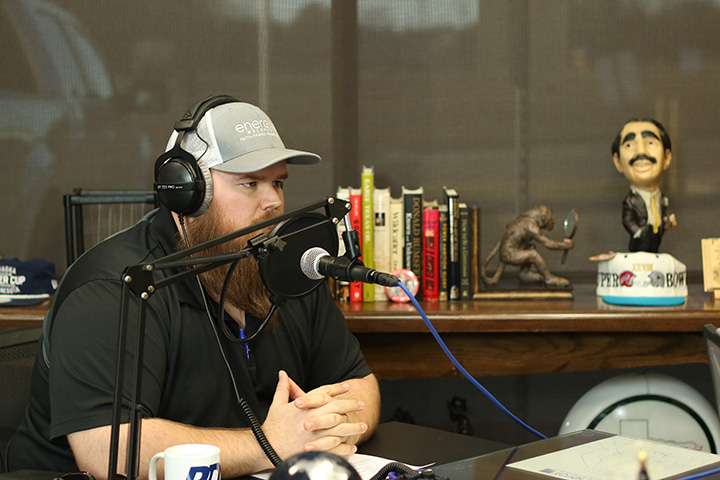It's an East Texas BBQ! We talk safety in the workplace - red wasps, spiders, fire ants, snakes, possums and other rodents.
Show Episode Transcript
Manufacturing Leadership
Spring Safety with Jacob Palmer
Intro:Welcome to manufacturing leadership, a podcast for young professionals in and out of the oil and gas industry. And now here's your host, Energy WeldFab's Michael Clements.
Michael C.: Hello listeners, welcome to manufacturing leadership an oil and gas podcast, I'm your host Michael Clements and I'm with Safety Director who at Energy WeldFab and good friend Jacob Palmer. How are you doing Jacob?
Jacob Palmer: Good morning Michael, great to see you again bud.
Michael C.: Yes sir, wonderful to see you, wonderful to have you on the show.
Jacob Palmer: Glad to be back.
Michael C.: We've got some excellent topics today, really just very extremely interesting topics to talk about today, spring safety.
Jacob Palmer: Yes man, this is a big time of the year for everybody not just our industry, got some things we need to talk about to prepare people for what's going to happen.
Michael C.: Well it may seem minute since we're talking about something as small as an ant, but these can be very big and a very big deal to those in the workplace. So we're going to get started here, and we just got a handful of things we'd like to inform leaders about and those in your organization, that may be working inside outside either way. There's just an abundance of things that start to occur in the spring, not only flowers start to bloom they bloom for a reason; there's a lot of bugs out.
Jacob Palmer: Yes, we're looking at a lot of bugs, in East Texas we deal with red wasp, we deal with bees, fire ants are a definite pest for us all year round, even getting into snakes and other rodents like rats, and raccoons and possums things that really can cause havoc in your workplace if you don't get on top of it.
Michael C.: Sounds like an East Texas barbeque.
Jacob Palmer: There you go.
Michael C.: Well jumping right into the wasp here, you know short story I was playing some softball shortly after I started college, and I went and got my glove and cleats out of my old baseball bag from high school and little did I know there were some red wasp lurking in there.
Jacob Palmer: Yes, and they can get into the smallest crevices man. Were they hiding in your bag or hiding in your glove?
Michael C.: They were in the glove, I put the glove it flew out stung me right in the bicep, my arm swell up to the size of a football.
Jacob Palmer: See that's the things we've got to watch out for, and we tell our employees especially our welders who wear gloves and things like that on a daily basis to always check their gloves. We have more of a problem with spiders which can be even scarier because we have some venomous spiders in East Texas, brown recluse or black widows so we really have to teach our guys to be checking those gloves before they put them on. And just a real quick story, a couple years ago we had a guy who was actually relaxing on his lunch break, and decided to kick his boots off and kind of cool off.
Well during that time of his break he had a spider crawled into his boots, and while he put them back on he was unaware and when he went back to work he felt something crawling up his leg. Luckily there was no bite, but just the sheer panic or phobia of spiders that could have caused an accident in the workplace, so it's really important that we're taking preventative measures to keep insects and things like that out of our work areas.
Michael C.: Well last thing I want is a snake or a spider in my boot. Touching on the wasp, anything that flies I mean really if it has an opening to it something can get in, a coke can is one that comes to mind for me, I've heard and I've also seen someone drink take a sip of a drink.
Jacob Palmer: Absolutely, I'm glad you brought up coke cans. A big part of dealing with insects and things in the workplace is how do you control them, how do you keep from attracting them and coke cans especially because of the sugars and things that they use, will really attract these insects.
And we want people to make sure they're picking up the trash and throw it away, and then keeping good housekeeping, but you want to eliminate that attracting because coke cans will attract ants, they'll attract bees, wasps all these things that we don't want bothering our employees.
Michael C.: Well if you're working in an environment that has wasps, bees anything that flies insects, there's some different things you can take to prevent that wear light-colored clothing, avoid perfumed soap, shampoos and deodorants. Also bathe daily, it sounds like if there's a stench or a smell of any sauce whether it's good sweet or not, or whether it's good to us insects are going to be drawn to it.
And then cover as much of your body as possible if you're going to be in these types of elements, and just keep your work areas clean. All type of bugs and insects love to gather around food, old coke cans, candy wrapper so that's why it's important to keep your work areas clean. I know in the shop this is something you do a daily walk through in all of our shops.
Jacob Palmer: And a big deal and we've talked to professionals about what's the best way to prevent these, because introducing poison or insecticides into a shop where people are working isn't always the best solution, because you don't want to expose your employees to that kind of stuff. So you're absolutely right on housekeeping, keeping these things cleaned up and picked up.
The professionals say the best way to eliminate a pest is to eliminate their food source, because if you think about it coke can, and food and things like that they attract flies and different kinds of larvae, well that's a food source for spiders and wasp and things like that. So you have to eliminate their food source and our food sources their foods food source, so we've really got to take extra measures to make sure everybody's doing their part and keeping their areas clean.
Michael C.: Yes, and if you're in one of these areas and you see these bees or wasp and you're like man that looks like a dangerous area, that looks like what was it in Lion King? You never go to the dark place.
Jacob Palmer: Oh yes there you go, you stay away from that. We tell the guys they need to report that to us immediately, they need to stay away from that stuff, we don't want to take any chances because some people may not be aware that they're allergic to these things, and we definitely don't want somebody getting stung or bitten and going into anaphylactic shock or anything like that, anything that would be a real danger to their life.
Michael C.: Well and surprisingly most bees and wasps will not sting you unless startled or attack, so don't swat at them if they're flying around you don't try to swat at them, just move, leave the area. Now you need to be observant because if you see multiple that means you may be close to a nest, and you to find out where they're coming from. Now that doesn't mean going to investigate, but it does mean be aware of your surroundings.
But don't make fast movements around these things, I know after being someone who's gotten stung and had to swell up and take medicine and all this stuff for a read wasp, I'm highly allergic, I do get a little alarmed but the best thing you can do is just stay calm, cool and collected while you're around a wasp.
Jacob Palmer: Absolutely, we don't want to do anything to draw attention to you, you just want to move out of the area as quickly as possible. And I do want to mention that if you are concerned about being allergic to these insects and things, do go to a medical professional and get tested and get an EpiPen prescribed to you.
And please make people around you aware that you are allergic, and if something does happen show them how to use your EpiPen or make them known about the EpiPen so that we can really take every advantage we can to save your life in case you are stung.
Michael C.: Yes, and it may sound a little corny to go through all that trouble just for a wasp sting or something, but hey it may save your life.
Jacob Palmer: Absolutely, people lose their lives every year to wasp and bee stings, if they're out in the woods during this time of year they're swarming, they're moving around in big groups, they're going and pollinating and it's springtime the SAP is rising so to speak. They're very active, they're in reproduction mode and that usually makes animals and insects more aggressive.
Michael C.: Well yes and as you're firing up those lawn mowers, weed eaters, chainsaws, all these different electrical power tools as you're doing more and more outside all that's going to do is tick these insects off.
Jacob Palmer: It's going to upset them; you're just disrupting their environment
Michael C.: So as you're doing those things just be just be aware, I think that's the biggest word here is just awareness, I don't know if you can actually ever just prevent a sting from happening, no one walks out or wakes up in the morning says hey I'm going to get stung by wasps.
Jacob Palmer: That's right.
Michael C.: I mean really just be aware, I think that that's the number one thing here.
Jacob Palmer: You got to be attentive. And most people who have genuine phobias, are but people who get relaxed in their work areas don't think about these little insects.
Michael C.: So onto another subject here, everybody's favorite snakes.
Jacob Palmer: Oh I'm terrified of snakes, but it is an issue that we have to deal with out here. In the past we've had problems with snakes’ copperheads, water moccasins unfortunately all snakes that are poisonous and they've created serious hazards for us in the past. Here at Energy we have boat material on the yard, that's either sitting on a pallet or it's stacked and snakes like to get into places where they can crawl and Sun and get warm, well we have pipe out in the yard and they love to lay on top of pipe which creates sometimes an environment for our employees to get close and personal with these snakes and possible to get bit.
And pallets, they like to hide in between pallets and things like that. We train and train and train our forklift operators and our yard personnel to be paying attention where they put their hands, when we train on pinch points we always mention watch where you're sticking your hand because there could be a snake, there could be a spider, there could be something there that is going to create an outside danger, so you've got to be paying attention.
Michael C.: How important is it this time you're also just be wearing your gloves?
Jacob Palmer: Absolutely, we issue all our guys impact gloves to help prevent the beating and the banging their hands, and they're also rubber-coated. So they would prevent, hopefully, a serious attack from a spider or a wasp or something.
I don't know if they would protect against a snake bite, but we do encourage these guys to make sure they're wearing them especially during the springtime, so that they don't beat and bang up their hands too bad.
Michael C.: Jacob how many snake sightings this time of year do we see around here?
Jacob Palmer: Every year we usually see 10 to 15, it's unfortunately common we're in the piney woods, there's water sources around our facility, snakes water and food this time of year like I said, that and reproduction they get aggressive, they get to moving, they're also shedding snake skins things like that that put them in our way, we're living in their world we're just trying to avoid them.
Michael C.: Right. That's another one, awareness you just got to be aware, a lot of times you're not going to just walk up and say hey I want to pet this snake, it's going to be something that's going to happen you're not going to be expecting it, but the biggest thing is just stay aware, be cautious, keep an eye out for insects, keep an eye out for wasps, bees, snakes anything else you got for us?
Jacob Palmer: We also have sometimes an issue with rodents with rats, and possums and raccoons and those critters they carry diseases, rabies and I think typhoid is one of them, things like that you've got to avoid those. And that goes back to the simple thing that we need to preach is keeping things clean, you've got to eliminate their food sources, don't keep food in your work areas that's not locked up, and always check your boxes to make sure that nothing's been tampered with because mice and rats and things can get into extremely small places similar to insects.
And when they build nest or they defecate things like that, they can really bring a danger health-wise to employees. So we're doing all we can to keep these pests and stuff out of the shops, and out of the exposure of our employees.
Michael C.: It sounds like there's just a lot to be concerned about.
Jacob Palmer: There is and people they kind of pass it off, but we're going to have a safety meeting and one of the main topics is going to be about this, to present that awareness. And luckily we have employees that have been here in the past, who have had to deal with the snakes and deal with the things that we've had, and they really help train the new guys and make them aware this is a real danger; it's something you need be paying attention to. Like I said spiders and gloves, it sounds like a small deal but the one time it's a brown recluse that bites you, it can be major issues.
Michael C.: Well and that brings me to the point for a leader, in an organization for the leaders be sure your folks are practicing that awareness. And if you do come into a situation where there's a rodent, where there's a snake, where there's a wasp nest, bees nest inside your facility, let's say a raccoon does get in one day, best thing you can do is just get the thing out, don't act cute and I think for leaders that's what you got to know. Is that you got to teach your people don't act cute, don't try to do something stupid, don't try to kill the animal, we need to open the doors, get out of its way and let it get out of the facility.
Jacob Palmer: Let it get out on its own, don't try anything crazy.
Michael C.: Don’t be a hero.
Jacob Palmer: Yes, don't aggravate it, don't poke it with sticks and if you're not mature enough or you don't feel comfortable to handle the situation, please let your Safety Department know, please let your supervisor know somebody who can handle the situation that will avoid incident altogether.
Michael C.: Well sounds like we're going to have a clear spring here as long as we maintain our awareness, keep your head on a swivel. So just a few places as the spring is here you all have already heard a few in the show, but just look out for inside hollow trees, walls, attics, nests that hang from branches or overhangs such as eaves of a building, in shrubs, bushes, hedges or on tree limbs. Rubber tires, crates, boxes, abandoned vehicles, look out for machinery I know we have forklifts and things on the yard, check those things in the morning before you just get in and take it for granted that there's no one else in there with you.
Jacob Palmer: That's right, because the one thing that we preach to our yard crew is you don't want to be in a situation where you and a snake are on the operation area of a forklift, because if you're moving a heavy load and that snake pokes its head out and you disrupt your operation ability, it can be catastrophic.
Michael C.: So the biggest thing is we just want to maintain our awareness, we want to stay on top of what we got going on in our work areas, and really just know that all these things are lurking around out there, they're waiting for you. Actually, they're scared of you as we are of them, they don't want they don't want anything to do with you, we're not anything special.
Jacob Palmer: We don't want to give them an opportunity to defend themselves.
Michael C.: Hopefully this can help you in your organization to maintain your awareness through the spring, and ensure a safe spring and as we go into summer hopefully we don't have any insect bite or anything like that. You know most of these insects and stuff they're only around for the spring anyway, a lot of them start to die off in the summer and as fall arises.
Jacob Palmer: As it gets hot we see a decline in activity, but still preparation, your preparation for the springtime should have started last year at springtime. We've always got to be a year ahead, and something else that we're fixing after start worrying about is heat stress. We've already started prepping in the winter time to start educating, we're fixing, actually putting into our meetings and reminding guys prepare your bodies for heat stress, start eating correctly, start drinking proper fluids and prepare for the heat.
Michael C.: Well we live in Texas, so it's only coming for us and we know it.
Jacob Palmer: We can't get away from it.
Michael C.: Well Jacob I tell you what that sounds like an idea for an excellent show, so I tell you what you think we could have you back on here soon?
Jacob Palmer: Absolutely, I'd be excited to come talk about heat stress.
Michael C.: Well wonderful, sounds like we already got our first topic for summer safety. So hope this helps everybody and our listeners out there, as well as the leaders in organization as you try to prepare your teams and those working inside and outside this spring. We would encourage everybody to be safe out there, be cautious, be aware, don't go looking for wasp and I hope everybody has a wonderful day, thank you for listening.





